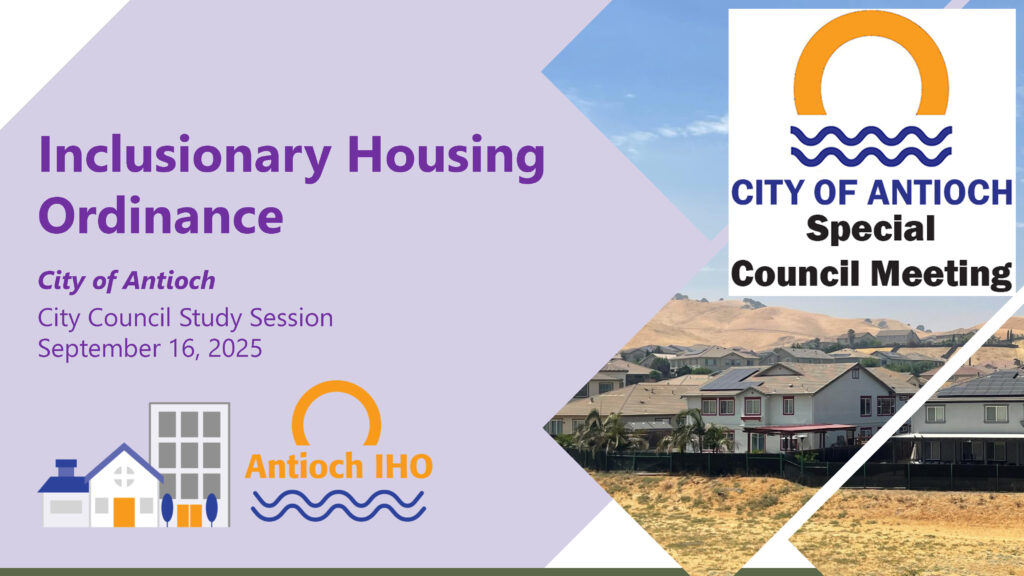TONIGHT! Antioch Council to hold special meeting on possible Inclusionary Housing Ordinance

Would require developers to allocate percentage of housing units in market-rate developments as affordable or below-market rate
May increase costs to new home buyers, reduce number of new housing units; “there would likely be a fiscal impact” to City, possibly increase revenue from developer fees
By Allen D. Payton
During a special meeting tonight, Tuesday, September 16, 2025, beginning at 6:00 p.m., the Antioch City Council will hold a study session to discuss a possible Inclusionary Housing Ordinance (IHO) and give direction to staff to develop one for a future vote.
According to the City staff report for the one item on the agenda, “An IHO, often referred to as inclusionary zoning, is an ordinance that requires developers to allocate a percentage of housing units in market-rate developments as affordable, or below-market rate (BMR) units.” Staff is recommending the Council support an IHO and a apply a 15% total inclusionary requirement to both rental and for-sale projects.
Background: “On May 27, 2025, the City Council held a study session on the possible adoption of an IHO, which is an Implementation Measure contained within the City’s Certified 6th Cycle Housing Element at Program 2.1.10. The possible adoption of an IHO can also be used for compliance with the Metropolitan Transportation Commission’s Transit Oriented Communities (MTC TOC) Policy, as discussed in the May 27, 2025 staff report, linked below.
“Staff and the project team provided a project overview, discussed the legal and local contexts of IHOs, presented the draft financial feasibility analysis, discussed the outreach process to date, and detailed next steps. Members of the community provided public input, however, due to time constraints, the City Council was unable to provide feedback and direction to staff.
“A second study session was held by the City Council on August 26, 2025. Similar to the prior study session, members of the public provided input and yet again, the City Council was unable to provide feedback and direction to staff due to the lateness of the hour. The City Council requested a Special Meeting for consideration of an IHO and has dedicated tonight’s meeting to this singular policy discussion.”
Staff Questions and Recommendations to Council
During tonight’s study session the staff are asking for answers from the Council on a variety of questions to develop an ordinance including:
- Should staff move forward with preparation of an IHO? Staff Recommendation: Yes.
- Should the IHO apply to rental projects, for-sale projects, or both? Staff Recommendation: Both
- Should the IHO include specific income category breakdowns – for example 5% VLI (Very Low Income), 5% LI, 5% MI – or should the developer be able to choose any affordability or combination of affordabilities? Other breakdowns could be 5% ELI, and 10% VLI or 5% ELI, 5% VLI & 5% LI or 3% ELI, 7% VLI & 5% LI, etc. Staff Recommendation: 15% total inclusionary requirement and this should apply to rental and for-sale projects.
- Should rental housing and for sale housing have different inclusionary requirements or the same inclusionary requirements? Staff Recommendation: Breakdown of specific income categories: 5% ELI, 5% VLI, 5% LI Maintain compliance with the MTC TOC Policy.
- Should rental housing and for sale housing have different inclusionary requirements or the same inclusionary requirements? Staff Recommendation: All housing types maintain the same inclusionary requirements.
- What should the threshold project size be to be included in the IHO? Staff Recommendation: Developments of 5 units and projects less than 5 pay an in-lieu fee.
- Should the units be affordable in perpetuity? Staff Recommendation: Yes.
- Should an in-lieu fee option be included as an alternative means? And should other alternative means be included? Staff Recommendation: An in-lie fee option should be included.
- Should the ordinance encourage on-site construction? If so, then by what means? Staff Recommendation: Encourage on-site construction by requiring a higher inclusionary ordinance requirement when a developer pays the in-lieu fee.
- Should there be developer incentives, beyond State Density Bonus Law? If so, by what means? Staff Recommendation: Waivers and fee deferrals
Challenges With IHO’s
According to the National Housing Conference, “ While advocates view inclusionary zoning as a way to increase the stock of economically integrated affordable homes at little cost to the public, critics charge that inclusionary zoning policies amount to a ‘tax’ on new development that unduly burdens developers and adversely impacts the cost and availability of market-rate homes.”
In addition, “Common opposition arguments include:
- Inclusionary zoning ordinances increase the cost of new development, which may then be passed on to market-rate buyers through increased home prices.
- Inclusionary zoning ordinances cause developers to build fewer units — either because developers choose to build in jurisdictions without inclusionary policies and/or because the inclusionary policies change the economics of development such that other land uses (e.g., retail) are more profitable.
- By reducing the supply of new homes, inclusionary policies increase the cost of market-rate housing in the community implementing the policy and in neighboring areas (as reductions in supply in one jurisdiction may increase home prices for the whole metropolitan area by reducing the supply of housing available to satisfy the area’s demand).
- Inclusionary zoning policies unfairly place the burden of economic integration on housing developers.
- The possibility that units produced by an inclusionary housing program might have a negative impact on nearby home values.”
A commentary on SRQmagazine.com by Christine Robinson, Executive Director of The Argus Foundation, entitled, The Negative Effects of Inclusionary Housing reports, “According to a study on Pittsburgh’s (Pennsylvania) inclusionary zoning policies, developers often respond to mandatory affordability requirements by decreasing the total number of units they build. This occurs because the cost of providing affordable units often makes projects financially unfeasible. As developers struggle to balance profitability with affordability requirements, some may abandon projects that require affordable housing even with increased density or scale back their ambitions.”
“While inclusionary zoning policies aim to create a more equitable housing market, the negative effects seen in Pittsburgh and elsewhere demonstrate that these policies may have unintended consequences that worsen housing affordability and reduce the availability of housing overall.”
Possible Fiscal Impacts to the City
Also according to the staff report, “Should the City Council choose to adopt an Inclusionary Housing Ordinance in the future there would likely be a fiscal impact due to increased staffing and administrative costs to implement the ordinance. There is also the possibility of additional revenue generation for housing production should the City Council choose to adopt an in-lieu fee as an alternative means of compliance.”
Meeting Details
The meeting will be held in the Council Chambers at City Hall, 200 H Street, in Antioch’s historic, downtown Rivertown. It can also be viewed can also be viewed via livestream on the City’s website and on the City’s YouTube Channel.
Click to read the full agenda packet, tonight’s presentation and the May 27, 2025 City staff report.
the attachments to this post:

Inclusionary Housing Ordinance presentation cover

























